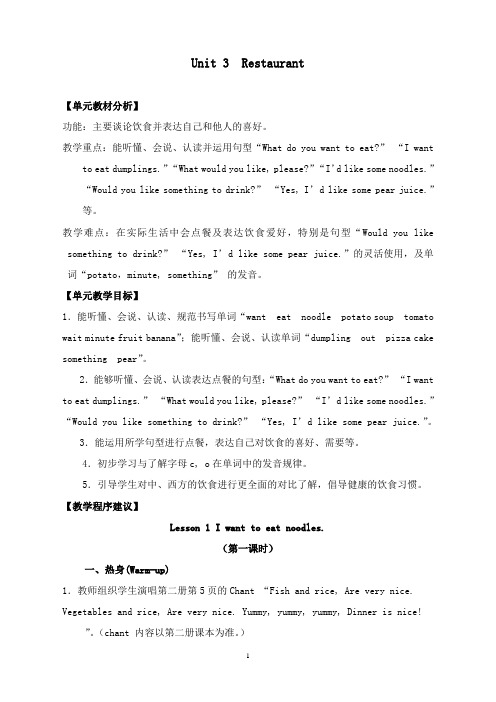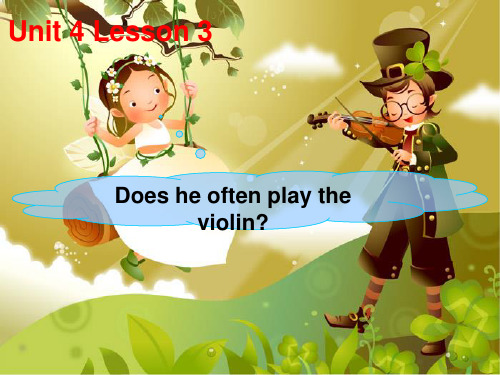鲁科版英语四年级下册Unit 4《Lesson 3 Does he often play the violin》ppt课件1
- 格式:ppt
- 大小:1.12 MB
- 文档页数:19

四年级英语下学期导学案Unit4 Weekend Lesson3【学习目标】1.能听懂、会说并认读句型:Does he often play the violin?及其答句:Yes, he does. No, he doesn’t.2. 能听懂、会说并认读单词violin, listen, take及短语play the violin, take pictures. 四会掌握单词take, listen.3.能运用句型D oes he often …? Do you oft en…来询问他人的周末活动。
【学习过程】一、旧知回顾1. 大声朗读下列句子,并翻译。
( 1 ) What does your father do at the weekend?__________________________________________。
( 2 ) I often visit my grandparents.____________________________________________。
( 3 ) Do you often do housework?____________________________________________。
( 4 ) Sometimes she goes to the cinema.____________________________________________。
( 5) He often plays football.____________________________________________。
(6)Wang Hong often goes to the cinema.______________________________________________。
二、预习导航1. 跟读课本Listen and say部分,画出下列句子,思考一下,并在横线写出其汉语意思。



Unit 3 Restaurant【单元教材分析】功能:主要谈论饮食并表达自己和他人的喜好。
教学重点:能听懂、会说、认读并运用句型“What do you want to eat?”“I want to eat dumplings.”“What would you like, please?”“I’d like some noodles.”“Would you like something to drink?”“Yes, I’d like some pear juice.”等。
教学难点:在实际生活中会点餐及表达饮食爱好,特别是句型“Would you like something to drink?”“Yes, I’d like some pear juice.”的灵活使用,及单词“potato,minute, something”的发音。
【单元教学目标】1.能听懂、会说、认读、规范书写单词“want eat noodle potato soup tomato wait minute fruit banana”;能听懂、会说、认读单词“dumpling out pizza cake something pear”。
2.能够听懂、会说、认读表达点餐的句型:“What do you want to eat?”“I want to eat dumplings.”“What would you like, please?”“I’d like some noodles.”“Would you like something to drink?”“Yes, I’d like some pear juice.”。
3.能运用所学句型进行点餐,表达自己对饮食的喜好、需要等。
4.初步学习与了解字母c, o在单词中的发音规律。
5.引导学生对中、西方的饮食进行更全面的对比了解,倡导健康的饮食习惯。
【教学程序建议】Lesson 1 I want to eat noodles.(第一课时)一、热身(Warm-up)1.教师组织学生演唱第二册第5页的Chant “Fish and rice, Are very nice. Vegetables and rice, Are very nice. Yummy, yummy, yummy, Dinner is nice!”。






一、教学目标:知识目标:------鲁科版英语四年级下册第四单元Lesson 3 Does he often play the violin?1.能听懂、会说并认读句型:Does he often play the violin?及其答句:Yes, hedoes. No, he doesn’t.2.能听懂、会说并认读单词violin, listen, take 及短语play the violin, takepictures. listen to music 四会单词take, listen.3.能运用句型Does he often …? Do you often…来询问他人的周末活动。
能力目标:灵活运用本课句型Does he/she often…? 及其答句Yes, he/she does. No, he/she doesn’t.询问别人经常做的事情。
情感目标:激发学生合理安排课余活动的意识。
二、教学重、难点分析教学重难点:1.本课时重点是学生能灵活使用Does he/she often ...?及其答句。
2.难点为violin 以及take pictures. No, he doesn’t的发音及灵活运用。
三、课前准备1.教师准备第三课时的三张单词卡及标题单词卡片。
2.教师准备课件和录音机。
四、教学过程一. Warm-up and previewT: Good morning, boys and girls.Nice to meet you. I am your new teacher.Nice to meet you.T: First, let’s play a game “sharp eyes”.. Are you ready?Ss: Ready.T: Let’s go.【设计意图】教师ppt 快速展现关于一些活动的短语,让学生快看快说,通过游戏的环节快速在脑海中积累本节课所需要的动词词汇,既能激发学生的兴趣,提高注意力,也为本课的学习做好词汇上的铺垫。
